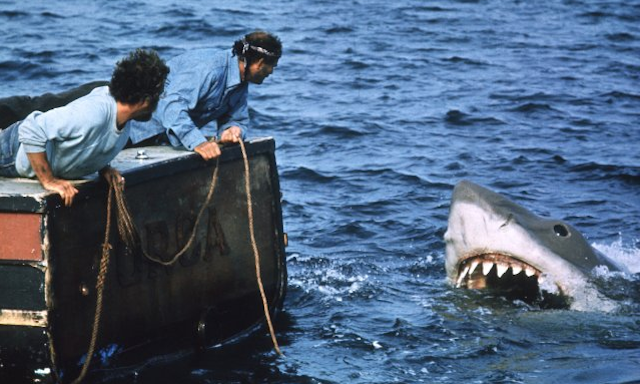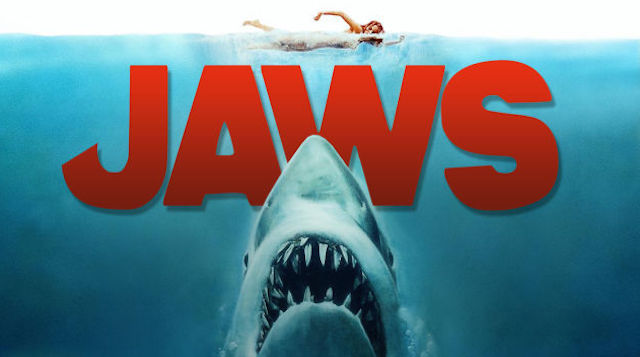To celebrate the 40th anniversary of its original release, Jaws will be shown on the big screen once more on June 21st. Few other movies have cast such a long shadow into the “real” world as the first summer blockbuster. As a marine biologist whose research focuses on shark conservation, I’ve been living in that shadow for my entire professional life.
Jaws was a great horror movie, perhaps too great. It made people absolutely terrified of real-life sharks. “There’s no question that Jaws terrified at least a couple generations of beachgoers and fed damaging misconceptions of sharks,” said Sonja Fordham, President of Shark Advocates International.
Many people, including my parents, were afraid to go swimming for months after seeing Jaws. Decades later, there’s almost always someone in the audience at my public talks about shark research and conservation who cites Jaws as “proof” that sharks are scary and bad.
The plot of Jaws revolves around a long-discredited scientific theory which claims that some individual “rogue sharks” develop a taste for humans and intentionally hunt us.
“There is nothing scarier or more fascinating than the intelligent monster,” said Dr Christopher Neff, a lecturer in public policy at Sydney University. “In this case, the story wasn’t that all sharks were bad but that certain sharks, particularly white sharks, could literally prey on swimmers. This meant that shark bites were not mistakes or accidents, but wanton ‘attacks.’”
For a group of animals in such danger of extinction, public misunderstanding and fear can be a big problem. It’s harder to convince people that we need to conserve and protect sharks when they think that sharks are scary and bad. Public misunderstanding resulting from Jaws even caused people to intentionally kill sharks by the thousands in a misguided belief that they were protecting themselves.
It’s not just misinformed fishermen who kill sharks to try and make people safer. Governments, most infamously the government of Western Australia over the last two years, have tried this same nonsense. Dr Neff calls this “the Jaws effect.”

“Jaws led to public acceptance that the state stepping in to kill sharks after shark bites was the right thing to do,” Dr Neff said. “The mistake in Jaws was seedy politicians not killing the shark sooner. The message was clear, killing sharks saves lives. And unfortunately we are still fighting this myth.”
This legacy of Jaws troubled Peter Benchley, the original author. He spent the last part of his career working to protect sharks through public lectures, documentary films, and the 2002 ocean conservation manifesto “Shark Trouble.” His wife Wendy helps to run the environmental organisation “Shark Savers” now a part of WildAid. There is even a major ocean conservation award named after him.
Jaws also had another important effect. “The film’s popularity revealed that while people were clearly scared to death of sharks, they were also utterly fascinated by them,” said Sonja Fordham. “Over time, however, that fascination and sharks’ villain image began to spark reflection and more study into their true nature, revealing an entirely different picture. With education and enlightenment has come widespread respect, increasing concern, and more recently a somewhat surprising amount of worship.”
Though sharks and their relatives are in danger of extinction, great whites are now well protected compared to many other species. Fordham said:
Great whites were some of the first sharks to be protected in South Africa, the US, Australia, and the European Union, and to receive global safeguards under international wildlife treaties… It’s quite extraordinary that the white shark — despite its killer reputation — has received protections at about the same pace as the kinder, gentler basking and whale sharks. At the same time, some of white sharks’ closest relatives — particularly makos — are still subject to much unregulated fishing. Perhaps the greater challenge for conservationists is to expand the growing concern for big sharks so that it benefits at-risk, closely related smaller and flatter species.
Jaws didn’t just help stir fascination towards sharks among the public. Many marine biologists trace their interest in our field to Richard Dreyfuss’ character “Hooper,” one of the first ocean scientists to be portrayed on the big screen.
Said Oliver Jewell, a PhD candidate studying great white sharks at the Royal Netherlands Institute for Sea Research:
I saw the movie when I was about five. It was probably the biggest early life influence on my career choice. The most captivating thing for me was the shark itself. The idea that there were these huge and magnificent animals out there — and that nobody knew anything about them really hooked me. Hooper, and the marine biologists in Jaws Revenge (Jake and Michael), were all inspirational to me, too, because they did what I wanted to do.
I still credit those early years of watching Jaws as inspiration, although sometimes a little shyly; I’m well aware many others used the movie to justify killing millions of sharks across the globe. For me, I hope I’ve used that early inspiration to change as many peoples negative perceptions on sharks as possible, both through my research and tourism work.
So what is the legacy of Jaws? Should we blame it for public fear and misunderstanding of sharks, or praise it for getting people interested? It’s probably a little of both. One thing is for sure: I can’t wait to see a movie that had such a major impact on my career in theatres for the first time!
David Shiffman is a shark conservation biologist at the University of Miami. Follow him on Twitter.
